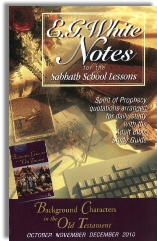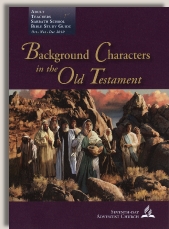|
||||||||||||||
Commentary on "Jonathan: Born for Greatness"
Day 1: Sabbath Afternoon, October 16, 2010 - Introduction
This week we take a look at Jonathan, the great friend of David, the Lord’s anointed. The Sabbath School Quarterly suggests several texts from the Bible for this week.
Jonathan and David present a fascinating study of one of the most interesting relationships presented in Scripture. This study has provided much material for both a proper understanding of relationships, as well has having been misused by organizations with a specific anti-Christian agenda.
A Suggestion
Although the Quarterly suggests reading various selections from 1 Samuel, 2 Samuel and 2 Kings, I suggest a reading of the book of 1 Samuel. Many may feel that to read an entire book of the Bible in a few days is too much. However, the book of 1 Samuel, 31 chapters long, takes the average reader about 2 1/2 hours to read. If you have an audio version of the Bible, it is a great idea to listen to 1 Samuel being read as you read along. The audio version of 1 Samuel, in the English Standard Version (ESV) takes 2 hours and 18 minutes. Some of these are available for free online, and some are available for purchase at your local Christian Bible/Book Store.
Armor-bearer
The suggested memory verse for the week includes some interesting information. In the ESV, 1 Sam. 14:6 reads,
Jonathan said to the young man who carried his armor, "Come, let us go over to the garrison of these uncircumcised. It may be that the LORD will work for us, for nothing can hinder the LORD from saving by many or by few."
A valuable study that can be done in 1 Samuel is to look at the work that the armor-bearer performs. The armor-bearer (“young man who carried his armor”) plays a critical role, not only for Jonathan, but for David, Saul, and all great or monstrous leaders in those ancient times. Although we don’t have the time here to go into detail about the armor-bearer, let’s look at a New Testament passage that refers to Christian armor-bearers.
In Ephesians we learn about the “armor of God.” As Ephesians 6:10-18 we learn about our role as the armor-bearer for the Lord.
Finally, be strong in the Lord and in the strength of his might. Put on the whole armor of God, that you may be able to stand against the schemes of the devil. For we do not wrestle against flesh and blood, but against the rulers, against the authorities, against the cosmic powers over this present darkness, against the spiritual forces of evil in the heavenly places. Therefore take up the whole armor of God, that you may be able to withstand in the evil day, and having done all, to stand firm. Stand therefore, having fastened on the belt of truth, and having put on the breastplate of righteousness, and, as shoes for your feet, having put on the readiness given by the gospel of peace. In all circumstances take up the shield of faith, with which you can extinguish all the flaming darts of the evil one; and take the helmet of salvation, and the sword of the Spirit, which is the word of God, praying at all times in the Spirit, with all prayer and supplication. To that end keep alert with all perseverance, making supplication for all the saints.
When the armor-bearers of David and Jonathan’s day carried the armor of their “lord,” they were primarily to “stand” with the armor “with all perseverance.” The armor bearers of ancient times were very strong men, who participated in the battle as much as the leaders/warriors they were assisting.
As Christians, we are commanded to “withstand in the evil day” (Eph. 6:13) as we put on the armor. Also, we do not participate in physical battles against our enemies; we participate in spiritual battles against the enemies that would distort and twist the message of the gospel of Jesus Christ to those who need it most – the unsaved.
“Heaven” and “Heaven’s Eyes”
Back to the Quarterly.
We are not living in the 19th century, but the 21st. The Seventh-day Adventist Church is inextricably tied in with 19th century individuals, specifically Ellen White, James White, Uriah Smith, and many others. With this relationship, it is hard to come into the 21st century and use language common to individuals today.
We no longer use phrases such as “heaven, though, uses a different measure for what’s great…” or “we learn to evaluate our lives through heaven’s eyes.” (p. 41 of the Teacher’s Quarterly)
Although the lesson author returns to the phrase “the eyes of God” later in today’s lesson, it is frustrating for those not familiar with this language to make the connection. (Ahh, but what can be done about that! Perhaps this is just a useless complaint, but hopefully with a point, nonetheless.)
David and Jonathan
The remainder of the week takes a look at the relationships between Jonathan and his friend David, and Jonathan and his father, Saul, the king of Israel. The quarterly focuses on issues such as, Friendship (tomorrow’s lesson), a victory of Jonathan, the relationship between Jonathan and his father, “Taking Second Place” (Wednesdays lesson), and “When Life Isn’t Fair” (Thursdays lesson).
This commentary on those lessons will address these issues with a primary focus on the person of Jonathan; how he loves David and ways we can take these historical realities and learn from them. The final point to consider as we begin this week is to understand who David is and who Jonathan is. 1 Samuel 16:13 tells us,
Then Samuel took the horn of oil and anointed him [David] in the midst of his brothers. And the Spirit of the LORD rushed upon David from that day forward. And Samuel rose up and went to Ramah. (ESV)
David is the first king of Israel chosen and anointed by God. He is the Lord’s anointed. The word “anoint” in the Hebrew (language of the Old Testament) is mashach (maw-shakh'). From mashach, we get the word mashiyach (maw-shee'-akh), literally meaning Messiah. When translated from the Hebrew into the Greek (language of the New Testament) we get the word christos, in English, Christ.
David is the first king chosen and anointed by God. Jesus is the eternal king of kings, who is, and always has been the anointed one, or Christ, the coming King. Like Jesus, David is the anointed and coming king of Israel long before he begins functioning in that office. Jonathan loves David, not only as his friend, but also as his lord and king.
As we begin to understand the relationship of Jonathan to David, it will help us to always keep in mind that David is the anointed king. Jonathan’s relationship to him is a great picture of the relationship between the believer today (Christian) and our anointed king, Jesus Christ. We cannot consider Jonathan as a “background character” of the Old Testament. Jonathan is a wonderful historical figure who is a great example of the life of a Christian in his/her relationship to our Lord Jesus Christ. As we continue this week, let’s continue to see Jesus on every page, and in so doing, see our relationship to him modeled by Jonathan.
Often Jesus is pointed to as the example for Christians to follow. This idea has severe limitations. To be sure, Jesus did provide great examples of loving others, speaking truth and selfless service. But Jesus was so much more than an example for us, that we can get carried away if we carry that idea too far. We cannot carry the example of Jonathan too far, except in the sense that he was human and sinned as we all do. But Jonathan faced situations and handled life experience, not as a background character, but as one called by God. Period.
You are not a “background character” in God’s story. You have been chosen to respond to the call of Jesus Christ, to be filled with the Holy Spirit, and to function in those roles in which God has gifted you. Let’s submit ourselves to him today, and the studies this week will take on an extraordinary dimension!
Summary
- Spend 30 minutes a day Monday through Friday reading First Samuel. (Or, if you prefer, spend 2 1/2 hours reading 1 Samuel in your “spare time.”)
- An armor-bearer is mentioned in the memory verse for the week. Armor-bearers were vitally important figures to kings, warriors and great leaders of the ancient world. Today, Christians have been called to be armor-bearers for the Lord. We are to put on all the armor of God, as outlined in Ephesians 6:10-18.
- Let’s attempt to use language from the 21st century, not from the 19th. If we mean God, let’s say God, not Heaven.
- Focus on the relationship between David and Jonathan. David is God’s anointed king (a type of messiah) for Israel. Jonathan is a son of Saul, the acting king of Israel, but loves David as his own soul. In this we can see how we, naturally born sons of an acting king of this world (our arch-enemy), but can accept the Spirit from the true King of kings, and ultimate Messiah of the world, Jesus Christ. We can then learn to love him and, like Jonathan, serve the true King, while not bringing harm to those who are still under the dominion of the false king of this world.
- You are not a “background character” in God’s story.
Copyright 2010 BibleStudiesForAdventists.com. All rights reserved. Revised October 14, 2010. This website is published by Life Assurance Ministries, Glendale, Arizona, USA, the publisher of Proclamation! Magazine. Contact email: BibleStudiesForAdventists@gmail.com.
The Sabbath School Bible Study Guide and the corresponding E.G. White Notes are published by Pacific Press Publishing Association, which is owned and operated by the Seventh-day Adventist church. The current quarter's editions are pictured above.
Official Adventist Resources
Standard Edition Study Guide Week 4
Teacher's Edition Study Guide Week 4
Easy Reading Edition Study Guide Wk 4
Search the Complete Published Ellen G. White Writings


